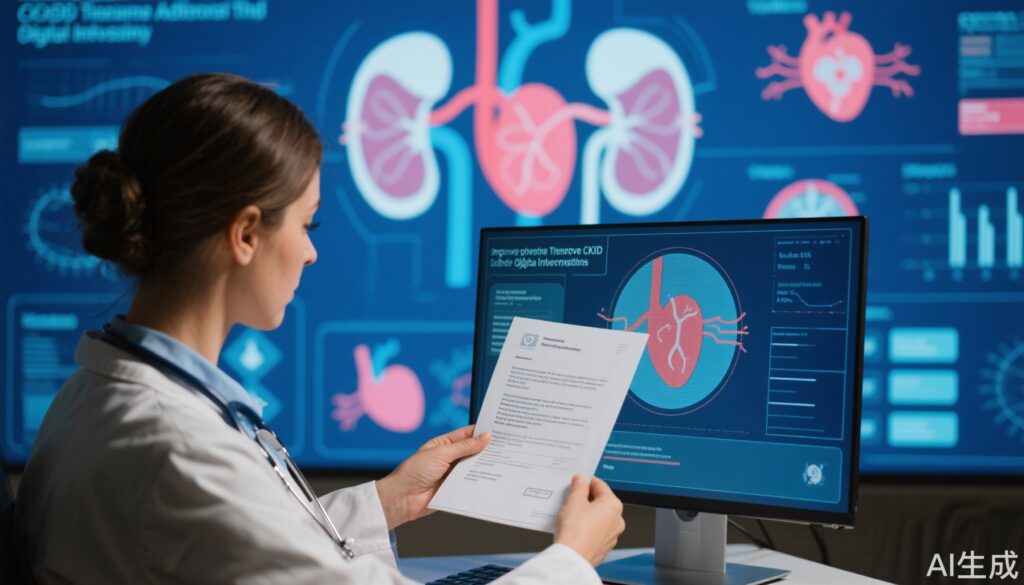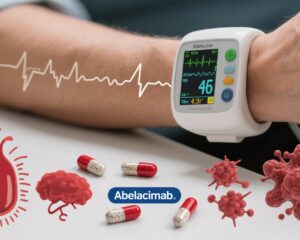Highlight
– The NUDGE-CKD trial investigated electronic letter-based nudges targeting patients with CKD and their general practitioners to increase uptake of guideline-directed medical therapy (GDMT).
– The trial enrolled over 22,000 patients and randomized both patients and their practices in a 2×2 factorial design.
– No statistically significant increase in prescription of renin-angiotensin system inhibitors or sodium-glucose cotransporter 2 inhibitors was observed with nudges versus usual care.
– The findings highlight challenges in improving GDMT adherence through electronic nudges alone in clinical practice.
Study background and disease burden
Chronic kidney disease (CKD) is a prevalent condition globally, characterized by progressive decline in renal function that significantly elevates the risk of cardiovascular morbidity and mortality. Effective pharmaco-therapeutic interventions, notably guideline-directed medical therapy (GDMT) such as renin-angiotensin system inhibitors (RASi) and sodium-glucose cotransporter 2 inhibitors (SGLT2i), substantially mitigate these risks. However, considerable underutilization of these agents persists despite robust clinical guidelines, resulting in modifiable adverse outcomes in this vulnerable population. Addressing barriers to the uptake of GDMT in routine clinical care is therefore a critical unmet need.
Study design
The NUDGE-CKD trial is a pragmatic, nationwide, 2×2 factorial randomized implementation study conducted in Denmark. The trial enrolled all adults with a hospital diagnosis of CKD who had access to the official Danish electronic letter system. At the patient level, individuals were randomized 1:1 to receive either usual care or an electronic nudge letter aimed at encouraging GDMT initiation and adherence. Independently, general practitioners (GPs) responsible for care of CKD patients were randomized 1:1 to either receive no letter or an electronic informational letter describing GDMT benefits and guidelines for CKD management.
The interventions were delivered concurrently on August 19, 2024. Data on prescription fills for RASi and SGLT2i within 6 months post-intervention were collected using comprehensive Danish national health registries. The primary outcome was defined as the proportion of patients filling at least one prescription of RASi or SGLT2i within this follow-up period.
Key findings
A total of 22,617 patients were randomized at the patient level, with 11,223 receiving the electronic nudge letter and 11,394 receiving usual care. Concurrently, 1,540 general practices caring for 28,069 patients with CKD were randomized to the provider intervention (774 practices, 13,959 patients) or usual care (766 practices, 14,110 patients).
Among patients receiving the patient-directed electronic nudges, 65.1% (7,303) filled a prescription for RASi or SGLT2i compared to 65.9% (7,505) in the usual care group (absolute difference: -0.79 percentage points; 95% confidence interval [CI]: -2.03 to 0.45; P=0.21). Similarly, in the provider-level intervention group, 63.9% (8,921) of patients filled a prescription compared to 64.4% (9,086) in the control group (absolute difference: -0.49 percentage points; 95% CI: -1.64 to 0.66; P=0.41). Importantly, no statistically significant interaction effect was observed between patient- and provider-level interventions (Pinteraction=0.85).
The trial found no evidence that either electronic letter-based nudge alone or in combination improved the uptake of guideline-recommended renal and cardiovascular protective therapies significantly beyond usual care. These null results were consistent across a large national population and robust registry-based outcome ascertainment.
Expert commentary
The findings underscore the complexity of implementing behavioral interventions such as electronic nudges within real-world clinical practice to enhance chronic disease management. The lack of meaningful improvement in medication uptake suggests that passive informational letters may be insufficient stimuli to overcome multifaceted barriers faced by patients and providers. These barriers include clinical inertia, competing priorities, patient health literacy, and system-level factors such as medication cost and access.
Complementary strategies, including more interactive or personalized decision aids, augmented clinical support, pharmacy integration, and targeted patient education, may be necessary to effect measurable increases in GDMT adoption. Moreover, electronic nudging interventions might benefit from integration within a broader multidisciplinary care model to optimize chronic kidney disease outcomes.
Limitations of the trial include reliance on prescription fill data as a proxy for adherence and lack of granular patient-level data regarding CKD stage, comorbidities, or reasons for non-initiation of therapy. Furthermore, the study population was limited to Denmark, and generalizability to healthcare systems with differing infrastructure and patient demographics should be cautiously considered.
Conclusion
The NUDGE-CKD nationwide factorial randomized trial rigorously evaluated electronic letter-based nudges directed at patients with CKD and their general practitioners to increase uptake of guideline-directed medical therapy. Despite a large sample size and robust data capture, the interventions did not significantly enhance prescription rates of RASi or SGLT2i compared with usual care.
These findings highlight the limitations of simple, passive electronic nudges delivered via letters in altering prescribing behavior and patient medication uptake in chronic kidney disease management. Future research should explore multi-modal engagement strategies addressing patient, provider, and system-level factors to optimize implementation of evidence-based therapies in CKD.
References
Skaarup KG, Johansen ND, Brandi L, Lindhardt MK, Bech JN, Svensson M, Kristensen T, Thuesen AD, Knudsen MG, Kampmann JD, Hornum M, Ørts B, Modin D, Lassen MCH, Janstrup KH, Claggett BL, Vaduganathan M, Bhatt AS, Van Spall HGC, Jensen JUS, Zannad F, Solomon SD, Møller A, Borg R, Birn H, Hansen D, Biering-Sørensen T. A Nationwide Factorial Randomized Trial of Electronic Nudges to Patients With Chronic Kidney Disease and Their General Practices for Increasing Guideline-Directed Medical Therapy: The NUDGE-CKD Trial. Circulation. 2025 Aug 12;152(6):369-383. doi: 10.1161/CIRCULATIONAHA.125.075403 IF: 38.6 Q1 . Epub 2025 Jun 7. PMID: 40481660 IF: 38.6 Q1 .


